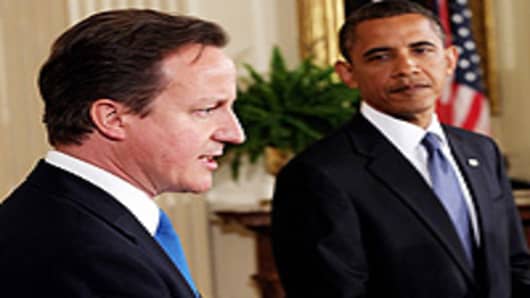The Organisation for Economic Cooperation and Development (OECD) warned the British government on Thursday that it must ease the pace of deficit reduction or risk damaging the recovery of the UK economy.
Pier Carlo Padoan, chief economist at the economic think tank, told the Timesnewspaper: ''We see merit in slowing the pace of fiscal consolidation if there is not so good news on the growth front.
''We have seen that (growth numbers) are a bit weaker than expected. Should that continue to be the case, there is scope for slowing the pace," he said.
The warning came as the OECDpublished its half yearly outlook for economic growth around the world revising down its annual growth forecast for the UK economy for the second time this year.
At the start of the year the OECD forecast growth of 1.7 percent, but in March it lowered its forecast to 1.5 percent. However on Wednesday it lowered its forecast again to 1.4 percent. It also lowered its growth forecast for 2012 from 2 percent to 1.8 percent.
It warned unemployment in the UK would rise from 7.9 percent to 8.1 percent of the population by the end of this year and would rise to 8.3 percent in 2012 as a result of the slow pace of growth.
And it added the Bank of England would need to make a modest rise in interest rates before the end of the year in order to tackle inflation in the British economy, currently at 4.5 percent, 2.5 percent above the central banks inflation target.
At a joint press conference in London on Wednesday US President Barack Obama pointedly refused to back UK Prime Minister David Cameron’s plans to deal with Britain’s budget deficit.
While saying that both he and the prime minister believed it was important not to leave the next generation with “a mountain of debt”, Obama said both governments must act to meet the challenge of stimulating economic growth.
“That requires us to continue to make investments in education, science technology, infrastructure, things that help our economies grow,” Obama said.
“This is going to be a constant process of trying some things, making adjustments and there are going to be opportunities for us to make investments, There will be other areas where we think those were good ideas at the time they were started….that have not worked out as well as we had intended," he told the press conference.
“If a program is not working well we should get rid of it and put our money into programs that are working well. It means that we have got to make sure that we take a balanced approach and that there’s a mix of cuts but also thinking about how do we generate revenues so there is a match between money going out and money coming in,” he added.
The UK’s opposition Labour party finance spokesman, Ed Balls, said the revised OECD forecast and Padoan’s comments showed Chancellor of the Exchequer, George Osborne, needed to change course on public spending.
"George Osborne's rigid determination, despite all the evidence, to stick with deep and fast cuts and refuse to even consider a plan B does not boost his credibility, it undermines it," he said.
"We know the government's most senior civil servants have drawn up a plan B, which ministers have hastily rejected. But it's now time George Osborne listened to wise advice, looked at what is happening to the economy and thought again about the speed and scale of his cuts," he said.


